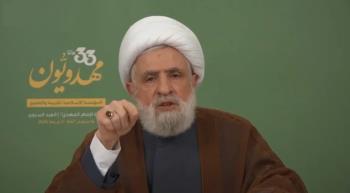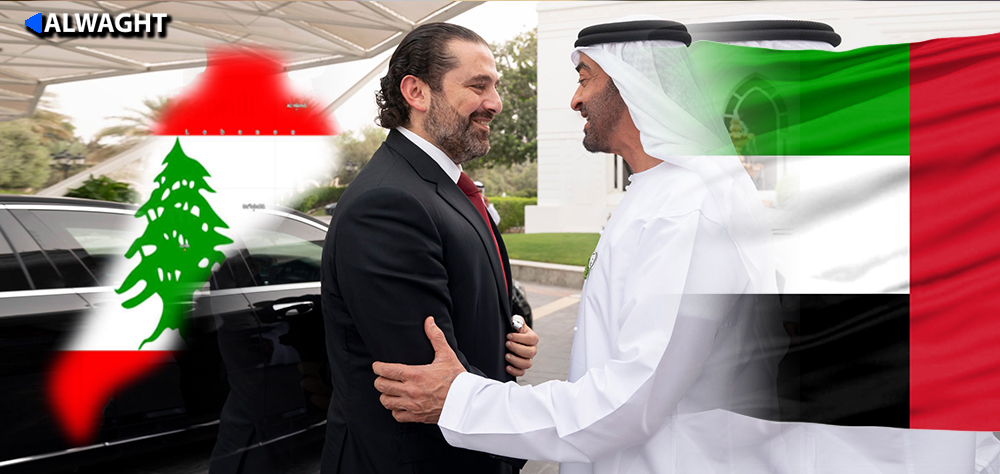Alwaght- While Lebanon's unprecedented financial and political crisis has paved the way for the involvement of foreign actors in the country, in recent months there has been a growing rivalry between the Persian Gulf Arab monarchies to play a role in Lebanon's developments and get a foothold.
After the Qatari foreign minister's visit to Lebanon on February 9 and offering financial assistance once the crisis-hit country formed a government and announcing readiness to host a political meeting gathering all Lebanese groups in Doha to address the current crisis and limbo, now media reports suggest that the UAE is trying to become a major supporter of Saad Hariri, Lebanon's Prime Minister-designate.
Al-Arabi Al-Jadid news outlet reported Abu Dhabi Crown Prince Mohammed bin Zayed made a financial offer to Hariri during the latter's recent visit to the UAE to reorganize Lebanese political and social institutions.
The UAE de facto ruler also suggested to Hariri that his family, who have lived in Riyadh for 20 years, be transferred to Abu Dhabi. Three drivers may stand behind such proposals.
Countering Muslim Brotherhood
The (Persian) Gulf Cooperation Council's atmosphere after signing the rapprochement agreement to end the anti-Qatari blockade last month remains immersed in political and geopolitical rivalry of the member states. In the meantime, the UAE's hostile policies towards the Muslim Brotherhood in Arab and Islamic worlds have not diminished. The UAE, which makes fight against the Brotherhood influence expansion one of its top policy pillars, continues to see the Islamist group, mainly supported by Qatar and Turkey, in Libya, Tunisia, Egypt, and other regional states the leading threat to its interests.
One of the important drivers behind the UAE's development of awareness and attention to Lebanon is feeling of threat marked by Brotherhood influence boost in Lebanon. Hariri traveled to Turkey in late January to meet President Recep Tayyip Erdogan of Turkey and asked for aids. He then met Qatari officials in Doha a month later on February 17.
Contrary to the crisis-making interventions of Saudi Arabia and the UAE in Lebanon, cooperation with Qatar is now welcomed by many Lebanese political factions, including Hezbollah and the Free Patriotic Movement led by Michel Aoun. This, from Abu Dhabi's point of view, means that Lebanon carries the potentials to become a play field for Emirates rivals. The Emirati foreign policy is based on investment strategy under the cover of political and financial assistance. The main aim of the Abu Dhabi ambitions is to build a sway over Lebanon.
During Hariri's visit to Abu Dhabi, amid the start of popular protests in October 2019, the Emirates promise to deposit up to $1 billion in the Lebanese central bank and lift the 2016 ban on Emirati citizens' travel to Lebanon.
Replacing Saudi Arabia in the US regional strategy
Certainly, the UAE's turn to Lebanon is not an ordinary move. Rather, it represents a new strategy in dealing with Lebanon based on a new reading of the developments and in accordance with the US agenda. Under Trump administration, the US sought to keep Hezbollah out of the cabinet by increasing the pressures on the Lebanese economy, through sanctions such as the Caesar Act– which sanctions any party dealing with the Syrian government– and blocking international financial aids to Lebanon.
The UAE now appears to be preparing to step out of Saudi Arabia's "big brother" shadow in the Cooperation Council, given its lead in normalization, cold Washington-Riyadh relations in the new period, and growing economic power and political influence compared to the Saudis. The invitation of Hariri to transfer his business and family from Saudi Arabia to the UAE can be precisely read as part of this strategy.
Economic interests in the Mediterranean
Financial interests are another driver behind the UAE push to move closer to Hariri.
In terms of geopolitical and geoeconomic position, Lebanon lies on the Mediterranean coast and its rich energy resources, which in recent years have become the center of competition between sides such as Cyprus, Egypt, Turkey, Greece and the Israeli regime.
Grappling with a severe economic crisis, Lebanon sets eyes on exploring and producing oil and gas from its fields in the Mediterranean. In the way of developing its energy infrastructures, Lebanon currently faces a serious challenge from the Israeli side. Still, planning to produce hydrocarbons from its fields in the Mediterranean for new sources of income occupies an essential place in the policies of the future government.
Since the UAE and Bahrain signed a normalization agreement with the Israeli regime on September 15, the UAE has taken many steps to strengthen its presence in the eastern Mediterranean.
The UAE, OPEC's third-largest oil supplier, has signed various trade and transit deals with the Israelis as part of the normalization deal, and DP (Dubai Ports World ) has offered to lease the port of Haifa, which is being developed by a Chinese company. In October, the Israeli pipeline company EAPC signed a contract to transport UAE crude oil to Europe via a pipeline connecting the Red Sea city of Eilat and the Mediterranean port of Ashkelon.
Towards this end, in December last year, the UAE joined as an observer member the EastMed Gas Forum (EMGF). Then Israeli and Emirati energy officials, accompanied by Abu Dhabi National Oil Company (ADNOC) representatives, discussed oil and gas cooperation.
Therefore, the preliminary gas explorations in Eastern Mediterranean are another reason for the Emirati interest to involve in the Lebanese developments.



























